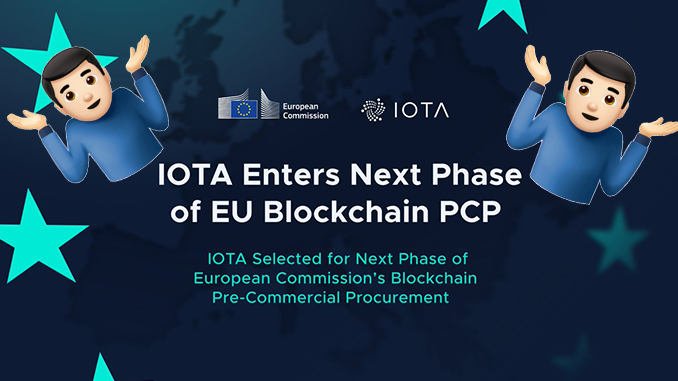
In February, IOTA Foundation CEO Dominik Schiener had surprisingly announced that the company wanted to manage without EU funding in the future. But now he has changed his mind and praises a blockchain initiative of the EU.
As head of the foundation, does IOTA co-founder Dominik Schiener make directional decisions depending on which leg he stands up with? At least, that’s the feeling one can get when looking at Schiener’s positions on EU projects. For a long time, IOTA’s involvement in the EU’s EBSI project was considered a showcase collaboration. But then in February, Schiener said the IOTA Foundation would “never again accept EU grants” and was generally dismissive of such alleged “dead ends” from the past. Now, however, Schiener is once again doing an about-face and praising the envisaged EU project European Digital Infrastructure Consortium (EDIC) in the highest terms on Twitter.
Europe needs an open and secure infrastructure to manage the digital transformation of the economy and society, Schiener said. IOTA is proud to contribute to this vision and thus create value for Europe and the world, Schiener continues. In addition, he points to IOTA’s supporting role in EBSI and makes it clear that they would also like to be involved in EDIC. According to the report on EDIC linked by Schiener, up to 7.5 billion euros of public money will be available there by 2027. That IOTA might try to secure some of the funding is understandable. But why Schiener is saying “giddy-up” today and “giddy-up” yesterday is not so easy to understand.
Schiener’s public communications have repeatedly come across as erratic and misleading. Whether in his statements on the IOTA side project Shimmer (SMR) or, for example, in accusations of insider trading – there are many an example from the past where Schiener galloped astray. Now, then, the turn from mockery of EU projects to great admiration, which Schiener pulls out of his hat.
Conclusion: EU projects way out for IOTA?
The finances of the IOTA Foundation are opaque and in the past year information circulated several times that the reserves are running low. Against this background, Schiener’s rediscovered love for the EU and lavishly filled funding pots is logical. But whether the Union and member states will agree to enter into new collaborations with the IOTA Foundation remains an open question. Schiener has also often poured scorn on Germany as a business location, describing it as hostile to the future and far too bureaucratic. Whether he is doing IOTA any good in this way is for others to decide.

Leave a Reply